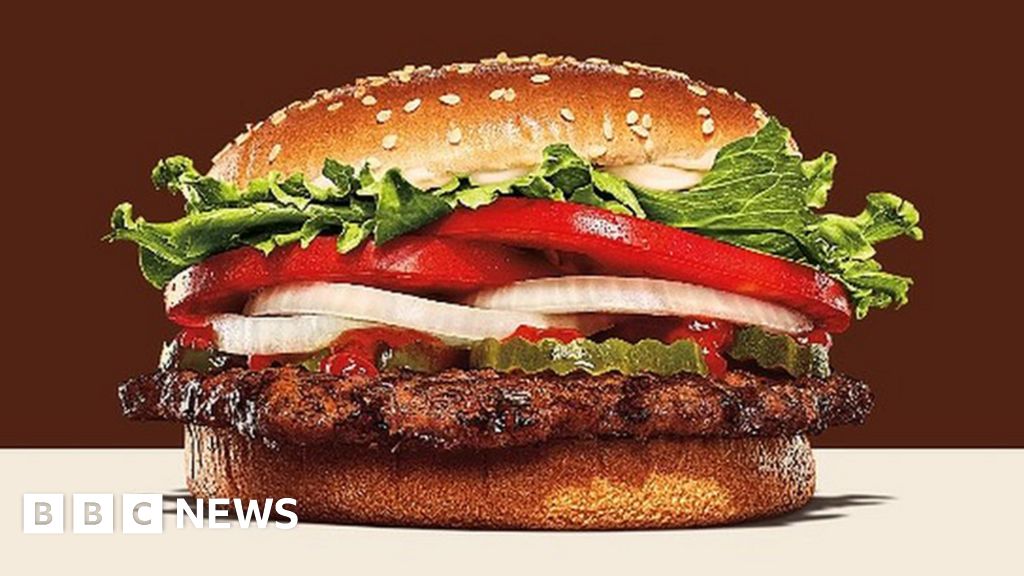Burger King Faces Legal Claim Over Size Of Whopper

The Whopper on Burger King's online menu
Burger King must face a lawsuit that alleges it makes its Whopper burger appear larger on its menus than it is in reality, a US judge has ruled.
The lawsuit accuses the fast food giant of misleading customers by showing the burger with a meatier patty and ingredients that "overflow over the bun".
"The plaintiffs' claims are false," Burger King told the BBC.
Rivals McDonald's and Wendy's are facing a similar lawsuit in the US.
The class action lawsuit against Burger King alleged that the Whopper was made to look 35% larger, with more than double the amount of meat compared to what was actually served to customers.
Image source, Getty Images
A Burger King Whopper hamburger on offer in a California restaurant
Burger King had earlier argued that it was not required to deliver burgers that look "exactly like the picture".
In the ruling, US District Judge Roy Altman said it should be left to jurors to "tell us what reasonable people think".
However, he dismissed claims that Burger King misled customers with its television and online advertisements.
"The flame-grilled beef patties portrayed in our advertising are the same patties used in the millions of Whopper sandwiches we serve to guests nationwide," a Burger King spokesperson said in a statement after the ruling.
Lawyer Anthony Russo, who represents the plaintiffs, did not immediately respond to a BBC request for comment.
Have you ever been disappointed by a food item you've ordered? Get in touch.
The Burger King website describes the Whopper as "the burger to rule them all", that contains a "real meaty" beef patty, and other ingredients.
Other fast food chains have recently faced legal challenges over claims of false advertising.
Earlier this year, Taco Bell was sued in the US for selling pizzas and wraps that allegedly contained half the filling that was advertised.
Last year, a man in New York proposed a class-action lawsuit against McDonald's and Wendy's, in which he accused the two companies of unfair and deceptive trade practices.
The lawsuit alleged that McDonald's and Wendy's burgers in marketing materials were at least 15% larger than they were in real life.
In the UK, the Advertising Standards Authority (ASA) looked into a complaint regarding an advert for one of Burger King's chicken burgers in 2010, which was upheld.
"In that case, the burger was not as plump and did not have as much filling as in the ad and so we banned it," Donna Castle from the ASA told the BBC.
"Consumers should be able to trust the ads they see and hear. Ads should not be materially misleading, should not be ambiguous and should not exaggerate or leave out any important information," she added.
From Chip War To Cloud War: The Next Frontier In Global Tech Competition
The global chip war, characterized by intense competition among nations and corporations for supremacy in semiconductor ... Read more
The High Stakes Of Tech Regulation: Security Risks And Market Dynamics
The influence of tech giants in the global economy continues to grow, raising crucial questions about how to balance sec... Read more
The Tyranny Of Instagram Interiors: Why It's Time To Break Free From Algorithm-Driven Aesthetics
Instagram has become a dominant force in shaping interior design trends, offering a seemingly endless stream of inspirat... Read more
The Data Crunch In AI: Strategies For Sustainability
Exploring solutions to the imminent exhaustion of internet data for AI training.As the artificial intelligence (AI) indu... Read more
Google Abandons Four-Year Effort To Remove Cookies From Chrome Browser
After four years of dedicated effort, Google has decided to abandon its plan to remove third-party cookies from its Chro... Read more
LinkedIn Embraces AI And Gamification To Drive User Engagement And Revenue
In an effort to tackle slowing revenue growth and enhance user engagement, LinkedIn is turning to artificial intelligenc... Read more

